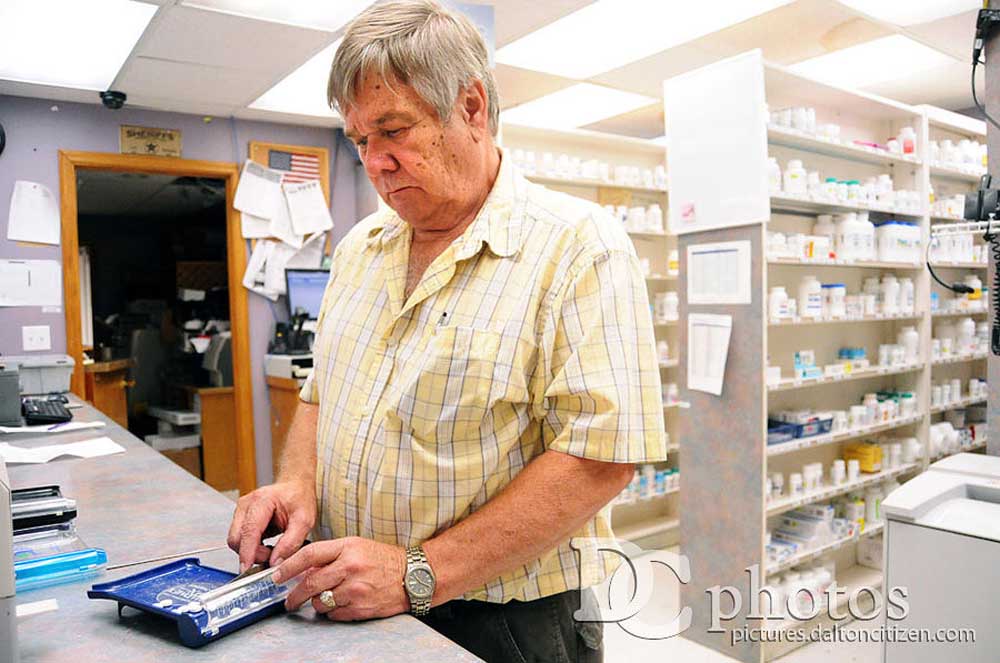‘Epidemic’ drug abuse
Published 2:18 pm Sunday, October 13, 2013

- Pharmacist Gene Leigh fills a prescription at S&W Pharmacy Friday. (Matt Hamilton/The Daily Citizen)
Stephen McHan said he hates what prescription drug abuse does to people, but he doesn’t know that the way a recent undercover law enforcement operation addressed its widespread existence will do much good.
Trending
“Personally, I think they arrested a bunch of old people,” said McHan, whose father, Raymond Junior McHan, was among 64 individuals charged in the operation the Whitfield County Sheriff’s Office led about two weeks ago. “My dad is almost 60 years old. I don’t see what good it’s doing for him to be in jail.”
Prescription drug abuse in recent years has become more widespread, according to several government agencies, and that’s led law enforcement agencies across the country to crack down on violators. In the local operation, authorities arrested young and old alike. Several people were in their 20s and 30s, but there were several older than 50 as well.
Pharmacist Ken Arthur of S&W Pharmacy on Cleveland Highway said he applauds law enforcement for their efforts because an arrest is often an avenue for people with a problem to finally be forced to get the help they need.
“Drug abuse is the saddest chapter modern society has,” Arthur said. “We as a society need to continue seeking these people out that are afflicted with this disease and place them in a position so they must choose to get help — the help that they need. Recent efforts such as those with local law enforcement and others are an essential part, and they should be applauded for their recent efforts.”
It’s not uncommon for such operations to feature undercover informants, often individuals who were caught committing a crime and opted to take a plea deal that involves helping catch other people in exchange for charges being dropped or lowered. Officials here declined to discuss how they conducted the operation, saying they don’t want to tip offenders off to their techniques.
Authorities have said Raymond McHan was selling prescription drugs from Genesis Variety Store on East Morris Street in Dalton, which he owns. He was charged with possession to distribute a schedule 3, 4 or 5 drug. He remained in the Whitfield County jail without bond as of Friday afternoon.
Trending
Stephen McHan said he’d never witnessed his father doing anything illegal, but he knows different people would often ask his father for anxiety medication prescribed to him.
“Honestly, I feel like he was entrapped,” Stephen McHan said. “Them people come in there, they beg you and beg you for them.”
Attorneys from the Public Defender’s Office represent about half of the defendants charged in the undercover operation. Assistant Public Defender Amber Connell said attorneys there are still looking into their cases and couldn’t immediately comment on the operation or individual cases. Most of the defendants were charged with illegally selling “scheduled” drugs, and some could face several years in prison.
Various kinds of drugs fall under certain schedules, and the penalties for drug violations are different depending on which schedule they involve. According to the Georgia Code, anyone who violates the law on selling a schedule 1 or 2 controlled substance, such as methadone, is guilty of a felony and shall be imprisoned for five to 30 years. If the person does it a second time, they are supposed to be sentenced to prison for 10 to 40 years.
For schedule 3, 4 and 5 drugs, such as alprazolam, violators are considered guilty of a felony and upon conviction are to be sentenced to one to 10 years in prison.
“For the sale charge itself, there has to be an exchange or an attempt to exchange,” Connell said.
Sheriff’s officers have said purveying prescription drugs on the black market can be lucrative for sellers who sometimes take in $2,000 or $3,000 for a month’s supply of narcotics.
Bill Pullen, an emergency room doctor at Hamilton Medical Center, said some would-be system-beaters use the ER to try to build up their supplies. Some even come in and bite their lip or another body part to draw blood, then transfer the blood to a urine sample to trick medical providers into thinking they need pain medication for kidney stones, he said.
Of course, there are plenty of people with legitimate needs also. Pullen said a recently started state database that shows when patients have had prescriptions from other locations is helping to cut down on the problem. Insurance companies often send notices to those who prescribe medications when prescriptions for the same kind of drug are filled in a short amount of time, he said, and that can be a clue a person may be doctor shopping. Plus, Pullen added, emergency room doctors try to be conservative with handing out narcotics prescriptions and encourage patients to see their regular doctors.
Lt. Nancy Chadwick with the Whitfield County Sheriff’s Office described the prescription drug abuse problem as an epidemic that affects people of all ages and backgrounds. Often, instead of just swallowing a pill, users will snort the drugs or shoot them, officials said.
“They’re just getting so out of control,” Chadwick said. “People have started using prescription drugs as a recreational drug instead of as needed. When you abuse it, you get a different effect than when you use it as directed.”
In recent years, the federal Drug Enforcement Administration created websites to inform parents and teens about the dangers of abusing prescription drugs. Among them are www.getsmartaboutdrugs.com, where readers learn that narcotics like OxyContin, codeine, morphine and methadone can be helpful for their ability to reduce tension, anxiety and aggression. Yet they can also lead to slowed physical activity, constipation, nausea, vomiting and slowed breathing, according to the site, and they can lead to dependence.
“Some of these preparations are so potent that a single dose can be lethal to an inexperienced user,” according to the site. “However, except in cases of extreme intoxication, there is no loss of motor coordination or slurred speech.”
Coming off the drug once you’re dependent isn’t easy. “Early withdrawal symptoms often include: watery eyes, runny nose, yawning and sweating,” according to the site. “As the withdrawal worsens, symptoms can include: restlessness, irritability, loss of appetite, nausea, tremors, drug craving, severe depression, vomiting, increased heart rate and blood pressure, and chills alternating with flushing and excessive sweating.”
Pullen and Arthur said drug abuse often destroys people’s lives.
“You eventually wind up that it gets to be your driving goal in life to get the drugs,” Pullen said. “It alters your work, your job performance, family life. You spend money — these things are really expensive on the street — and people neglect their house payments or electricity bills. And it ruins your family life, your livelihood, and of course if you’re impaired and you’re out and you have a wreck, then you could go to jail. You could kill somebody.”






